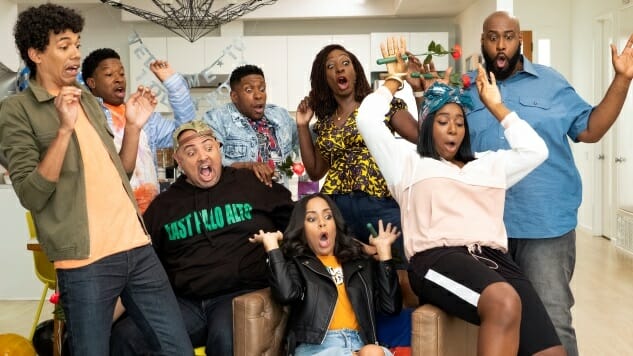Netflix’s Astronomy Club Is The Sketch Comedy Show For Black Nerds
Photo by Lara Solanki/Netflix
“Why the name Astronomy Club? We’re black, and we’re all stars. And like most stars, nobody knows our names.”
The pilot of Astronomy Club (“A Netflix Original Sketch Comedy Series”) makes clear that that’s not even necessarily the definitive explanation behind the sketch comedy troupe Astronomy Club’s name—and there never is a definitive explanation given in the series’ six-episode first season—but it’s certainly the most logical one. (Based on the series’ sketches and the team’s general comedic sensibilities, it may also have something to do with black nerdiness, as well. The first sketch of the series has “a Dracula,” and then it’s all off the rails from there.) As was the case when the show was first announced back in July, the biggest name involved in the making of Astronomy Club at this point—other than Netflix—is Black-ish creator Kenya Barris, who serves as executive producer of the series.
As a comedy team, series writers, and executive producers, Astronomy Club consists of eight members: Shawtane Bowen, Jonathan Braylock, Ray Cordova, James III, Caroline Martin, Jerah Milligan, Monique Moses, and Keisha Zollar. The first all-black house team to come from Upright Citizens Brigade (UCB), Netflix’s Astronomy Club is the natural evolution of what the octet has been doing since its formation in 2014, as well as the natural progression from their 2018 in digital series (six episodes, six sketches) on Comedy Central’s site.
As a series, Astronomy Club adds more ammo to the argument that it’s a pretty great time to be a fan of sketch comedy—specifically, televised sketch comedy—right now. Just this year alone, there have been excellent new offerings in shows like Netflix’s love-it-or-hate-it I Think You Should Leave with Tim Robinson, HBO’s star-powered A Black Lady Sketch Show, and IFC’s hybrid comedy Sherman’s Showcase. As for established sketch comedy shows, IFC’s Canadian import Baroness Von Sketch Show remains as strong as ever; and for as much baggage as there is that comes with Saturday Night Live, it’s still an institution that can provide some very special sketches when you least expect it (like this season’s “Grouch” or “Mid-Day News”). And the best part of all of this is that these shows are all doing something very different in their approaches to sketch comedy, which means that there truly is something for everyone—and that there’s also more room for every more variety and new approaches to the genre.
Naturally, the comparisons are going to—and kind of have to—be made between Astronomy Club, A Black Lady Sketch Show, and Sherman’s Showcase, as the three black-created and led sketch shows in this conversation. That there are three sketch shows created by and starring black comedians currently airing—instead of the television gods just saying there’s only room for one at a time—is worth noting, both as evidence of how far things have come in the genre and in that the gatekeeper institutions of comedy (like UCB) do actually have diversity coming through them and succeeding. Structurally, Astronomy Club and A Black Lady Sketch Show are the most similar, with both the framing device that serves as a breather between sketches and the general sketches themselves; though Astronomy Club doesn’t do recurring characters and bits the way A Black Lady Sketch Show does. All three shows approach comedy and blackness differently, with none of them claiming to be the definitive representation of blackness while still find commonality and relatability.* A lot of that relatability comes simply from the perspective of black nerdiness, with Astronomy Club (especially) and A Black Lady Sketch Show leaning into it and its contemporary pervasiveness, while Sherman’s Showcase was designed to center on someone who pushed against that shift (while also making the big throughline of the season the nerdiest thing of all: time travel). For example, Astronomy Club’s Katt Williams (played by James III) teaching the works of Shakespeare like a pimp and A Black Lady Sketch Show’s Cardi B/Nicki Minaj stan take on Romeo & Juliet are conceptual mirrors of each other, two completely different approaches to black nerdery.
-

-

-

-

-

-

-

-

-

-

-

-

-

-

-

-

-

-

-

-

-

-

-

-

-

-

-

-

-

-

-

-

-

-

-

-

-

-

-

-








































